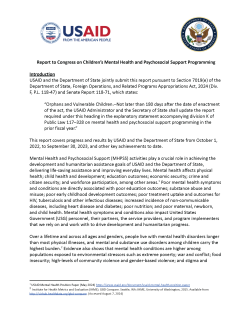Introduction
USAID and the Department of State jointly submit this report pursuant to Section 7019(e) of the Department of State, Foreign Operations, and Related Programs Appropriations Act, 2024 (Div. F, P.L. 118-47) and Senate Report 118-71, which states:
“Orphans and Vulnerable Children.--Not later than 180 days after the date of enactment of the act, the USAID Administrator and the Secretary of State shall update the report required under this heading in the explanatory statement accompanying division K of Public Law 117–328 on mental health and psychosocial support programming in the prior fiscal year.”
This report covers progress and results by USAID and the Department of State from October 1, 2022, to September 30, 2023, and other key achievements to date.
Mental Health and Psychosocial Support (MHPSS) activities play a crucial role in achieving the development and humanitarian assistance goals of USAID and the Department of State, delivering life-saving assistance and improving everyday lives. Mental health affects physical health; child health and development; education outcomes; economic security; crime and citizen security; and workforce participation, among other areas.1 Poor mental health symptoms and conditions are directly associated with poor education outcomes; substance abuse and misuse; poor early childhood development outcomes; poor treatment uptake and outcomes for HIV, tuberculosis and other infectious diseases; increased incidence of non-communicable diseases, including heart disease and diabetes; poor nutrition; and poor maternal, newborn, and child health. Mental health symptoms and conditions also impact United States Government (USG) personnel, their partners, the service providers, and program implementers that we rely on and work with to drive development and humanitarian progress.

